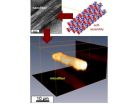(Press-News.org) CHAMPAIGN, Ill. — A new study finds that most U.S. adults fail to meet recommended daily levels of 10 key nutrients, and those with disabilities have even worse nutrition than average.
An estimated 10 to 25 percent of U.S. adults fit into one or more category of disability, from those who have difficulties with activities of daily living, such as dressing, bathing and eating, to those who cannot use their legs or struggle to accomplish routine tasks, such as money management or household chores.
To determine how these physical or mental difficulties can affect nutrition, University of Illinois researchers analyzed two waves of self-reported food and supplement consumption data from 11,811 adults, more than 4,200 of whom qualified as disabled. The team drew the data from the 2007-2008 and 2009-2010 National Health and Nutrition Examination Surveys, which are conducted by the National Center for Health Statistics.
"We conducted statistical analyses to compare people with and without disabilities in terms of nutrient intake," said University of Illinois kinesiology and community health professor Ruopeng An, who led the effort. He and his colleagues report their findings in the Journal of Human Nutrition and Dietetics.
"We found that American people consume much lower amounts of nutrients than are recommended," An said. "For example, only 11.3 percent of people meet the daily recommended intake of fiber. Only 4.7 percent of adults consume recommended amounts of potassium."
A large majority of U.S. adults also fall short of recommended intakes of vitamin A, vitamin C , vitamin D, calcium and iron, An said. They also eat more saturated fat, cholesterol and sodium than recommended, he said.
The picture for those who are disabled is even bleaker. Disabled American adults were even less likely than those without a disability to meet recommended dietary levels of saturated fat, fiber, vitamin A, vitamin C, calcium and potassium, the researchers report. The only exceptions (for intake of vitamin A, vitamin C and fiber) were among people with the lowest level of disability, whose intakes were comparable to non-disabled adults, An said.
"In general, people with disabilities are also disadvantaged nutritionally compared with people without disabilities, even though the bar is already so low," he said.
Those with the most severe physical and mental challenges were also the least likely to eat well, An said. This makes sense if one considers the challenges they must overcome to obtain, prepare and eat a healthy diet, he said.
"Physically, financially and mentally, they have different barriers to accessing healthy food," he said.
A trip to the grocery store can be a challenge for anyone who uses a cane, walker or wheelchair to get around. Some cannot grasp small items, open cans or jars, or stand at a countertop to prepare foods. Some have difficulty chewing or digesting certain foods, or may be restricted to a liquid diet. Or they use medications that affect their appetite or ability to taste foods, An said.
"Dietary supplement use moderately improved vitamin C, vitamin D and calcium intakes," the researchers reported.
"Policymakers and activists for the disabled traditionally have focused primarily on improving transportation options and the physical accessibility of buildings, roads, paths and parking lots," An said. "Now it's time for them to turn their attention to the nutritional challenges that confront people with disabilities."
INFORMATION:
Editor's notes:
To reach Ruopeng An, call 217-244-0966; ran5@illinois.edu.
The paper, "Nutrient intake among U.S. adults with disabilities," is available online or from the U. of I. News Bureau.
URBANA, Ill. – Although it would seem logical that large numbers of roosting birds would attract more mosquitoes that carry West Nile virus and contract the disease when bitten, recent research at the University of Illinois found the opposite to be true. That is, when large groups of birds roost together the chances that an individual bird will get bitten by mosquitoes carrying West Nile virus and subsequently contract the disease actually go down.
"Our study is the first field-based evidence to support what's called the 'encounter-dilution effect' acting in a ...
COLUMBUS, Ohio: Astronomers have gotten the closest look yet at what happens when a black hole takes a bite out of a star—and the star lives to tell the tale.
We may think of black holes as swallowing entire stars—or any other object that wanders too close to their immense gravity. But sometimes, a star that is almost captured by a black hole escapes with only a portion of its mass torn off. Such was the case for a star some 650 million light years away toward Ursa Major, the constellation that contains the "Big Dipper," where a supermassive black hole tore ...
Using a technique that illuminates subtle changes in individual proteins, chemistry researchers at Cornell University have uncovered new insight into the underlying causes of Amyotrophic Lateral Sclerosis (ALS).
Brian Crane, professor of chemistry and chemical biology, led one study and co-authored a follow-up on a spectroscopic method that detects subtle changes to copper-containing proteins in solution. He and Jack Freed, professor of physical chemistry, have developed the method together with Petr Borbat, associate director of Cornell's National Biomedical Center for ...
ITHACA, N.Y. – To solve a mental puzzle, the brain's executive control network for externally focused, goal-oriented thinking must activate, while the network for internally directed thinking like daydreaming must be turned down to avoid interference – or so we thought.
New research led by Cornell University neuroscientist Nathan Spreng shows for the first time that engaging brain areas linked to so-called "off-task" mental activities (such as mind-wandering and reminiscing) can actually boost performance on some challenging mental tasks. The results advance ...
Researchers at the New York University Polytechnic School of Engineering have broken new ground in the development of proteins that form specialized fibers used in medicine and nanotechnology. For as long as scientists have been able to create new proteins that are capable of self-assembling into fibers, their work has taken place on the nanoscale. For the first time, this achievement has been realized on the microscale—a leap of magnitude in size that presents significant new opportunities for using engineered protein fibers.
Jin Kim Montclare, an associate professor ...
In this image taken by the Aqua satellite of the southern United States actively burning areas as detected by MODIS's thermal bands are outlined in red. Each red hot spot is an area where the thermal detectors on the MODIS instrument recognized temperatures higher than background. When accompanied by plumes of smoke, as in this image, such hot spots are diagnostic for fire. These fires are a combination of small wildfires and prescribed fires. On the U.S. Forest Service website a prescribed fire is set to reduce tree overcrowding, revive fire-dependent species and reduce ...
Despite a dramatic increase in public awareness and anti-bullying legislation nationwide, the prevalence of bullying is still one of the most pressing issues facing our nation's youth, according to a report by researchers from Clemson University and Professional Data Analysts Inc., and published by the Hazelden Foundation.
"Bullying continues to affect a great number of children in all age groups, with the highest prevalence observed in third and fourth grades, where roughly 22 percent of schoolchildren report that they are bullied two or three times or more per month," ...
A new test, developed by University of British Columbia researchers, could help physicians predict within an hour if a patient will develop severe sepsis so they can begin treatment immediately.
Sepsis, a syndrome caused by infection, leads to organ failure and is responsible for up to five million deaths annually. There are 18 million cases of sepsis worldwide every year.
The discovery could cut back on the lengthy diagnostic time usually required to confirm if a patient is suffering from sepsis and increase the odds that they will respond to treatment.
"We identified ...
Scientists have found a molecule that could potentially accelerate clinical trials to combat autoimmune diseases.
Researchers from the Australian Regenerative Medicine Institute (ARMI) at Monash University and the European Molecular Biology Laboratory (EMBL) in Italy believe the molecule, called insulin-like growth factor-1 (IGF-1), could play a key role.
Autoimmune diseases occur when a group of immune cells called pro-inflammatory T-effector cells become sensitised to specific cells in the body, identifying them as foreign and attacking them as if they were invading ...
Sediments associated with dredging and flood plumes could have a significant impact on fish populations by extending the time required for the development of their larvae, according to Australian researchers.
"Sediment concentrations at levels found in plumes from dredging or in floods cause a significant delay in the development of clownfish larvae," says study lead author, Dr Amelia Wenger, from the ARC Centre of Excellence for Coral Reef Studies (Coral CoE) at James Cook University.
"This in turn could significantly reduce the numbers of larvae competent to settle ...




